- Home
- Johnny D. Boggs
Summer of the Star Page 6
Summer of the Star Read online
Page 6
Tommy almost tripped over my boots, making his escape. I cussed, and followed him.
Luckily—if you could call it that—the next place we stopped at, we got invited in, and not run off.
chapter
7
Remember me saying that Ma called my great memory a blessing. Well, I don’t recall a thing after Tommy and I entered that bucket of blood in Nauchville. By thunder, I don’t even remember the name of that saloon—if, indeed, it had a name. Keep in mind, that I would spend better than four more months in Ellsworth, would frequent Nauchville regularly, but even back during the summer of ’73, I could not point out which saloon had tempted, and tormented, Tommy Canton and me.
No, the next thing I recall was the following morning. Waking up, head thundering like the hoofs of ten thousand cattle, I thought I had dreamed that I had thrown up. But when I rolled over, I realized that had been no dream.
“You’re cleaning that mess up.”
Each word sounded like a cannon exploding inside my skull, causing my brain to bounce as the words ricocheted off the insides of my head. My stomach turned over. I thought I would vomit again.
“You’re cleaning it up, and you’re getting off this boardwalk.”
I groaned.
“Or you’re going to jail.”
My eyes opened. Sunlight blinded me.
“I mean it, mister.”
Squeezing my eyelids shut, I mumbled: “Shut up, Tommy. Only I added some salty words to my instructions.
A boot tip slammed into my side. Hard, and painful, and more words hammered at me and my throbbing head.
I rolled over. The boot clipped my hip. Frantically I crawled to the side, got kicked again, this time in my buttocks.
“I mean it, you lousy piece of Texas filth. This isn’t The Bottoms. This is Ellsworth, and this is a respectable establishment. You’re cleaning up the mess you’ve made, and you’re getting out of here before we open for business. Now. Before I decide you’re not worth the law’s time, and I break open a shotgun and box of twelve-gauge shells and deliver something that will hurt you worse than that rotgut you drank last night.”
Those words, despite my wretched hangover, I’ll never forget. Nor will the image of Estrella O’Sullivan, when I finally reached up, grabbed the railing, and somehow raised myself into a seated—slumped, might be a better description—position, and stared up at my attacker.
“You ain’t Tommy,” I managed to say, and felt the sticky mess on my once-clean, once-new, once-beautiful 65¢ shirt. “You’re a girl.”
“My, you are observant, aren’t you. And, no, I’m not Tommy. She glared.
“I ruined my shirt,” I moaned.
“Yeah, and your pants, and your hat, and your dignity, if ever you had any. Get up. She made as if her laced-up boot would strike me again, therefore I managed to stand, backing away into the corner, covering my face with my stinking arms.
She shook her head. “Don’t move. She reached into her purse, withdrew a key, and turned to the door. I looked inside one of the windows, saw neatly folded shirts, bolts of calico cotton, and a couple of spinning tops for kids. The door opened, a chime sounded and felt like it was pounding my head, and I debated if I could release my grip on the railing without crashing to the planking or the dirt that filled the alley. Don’t move, she had said. By grab, I found myself in no condition to go anywhere, excepting a cemetery. That moment, I would have welcomed death.
Ellsworth had awakened. The real city, I mean. By this time, I imagined that Nauchville had gone to sleep. I smelled coffee and bacon, which did my stomach no good, heard someone barking out news from the headlines in the local newspaper. Two buggies clopped down the wide street. Some ladies walked by, quickening their leisurely pace after glimpsing me. That’s another thing I’ll never forget, the look of disgust that transformed their faces as they rushed past me.
The chime above the door sang out again. The door slammed shut behind the girl. My head drummed. I increased my hold on the railing.
The girl dropped a bucket at my boots, soapy water spilling over the sides, and the handle of a mop somehow fell into my left hand.
“Clean this up,” she said. “Or I find Marshal Norton and have you hauled off to jail.”
I barely managed to say: “Yes, ma’am.”
Her mouth moved, but no words came out. Her look almost matched the one those ladies had just given me, as she turned on her heel like a fine cutting horse and headed back inside. The chime sounded as loud as a train whistle.
For a minute or two, I leaned against the mop handle, fearing I’d topple over without its support. Finally I stuck the mop in the bucket, barely managing to keep the thing from spilling. Relief swept over me. Had that water dumped out, I knew I’d be carted off to jail. So I pulled the mop out, and began working at cleaning up the mess I had made on the pine planks.
As a horse galloped past, I managed to pull the brim of my hat down, just in case it was someone from our crew of drovers. No self-respecting cowboy would be caught dead with a mop in his hands. I worked haphazardly at first, then began to put elbow grease into my efforts. That’s because I saw the girl staring out through the glass, and those dark eyes told me I’d better get busy and stop playing.
It’s hard for me to admit, even after all these years, but I wound up on my knees, scrubbing until that porch was pretty clean. Oh, I wasn’t winning any race. I’d work, then stop, sweating, waiting for the nausea to subside, or hiding behind my hat if I spotted a cowhand staggering down the street. I don’t know how long I mopped and scrubbed, but my legs were working, the nausea finally passed, and I lugged the dirty water off the boardwalk, and turned down the alley, where I disposed of it.
When I came back around, I saw the wooden sign, painted in red, white, and blue letters, flapping in the wind—STAR MERCANTILE. The hinges squeaked, but the noise didn’t torment my brain any more.
Halfway to the entrance, the door opened, and the black-haired girl stepped outside. She looked left and right at the freshly scrubbed planks, and pursed her lips for a brief moment. Her eyes locked on mine, then the door shut behind her. I just stood there, only stepping aside to let a man in black broadcloth head to the shop next door. Then I moved back a few steps, and looked at that sign.
“Star Mercantile,” I said aloud.
“Well, you can read better than you can drink John Barleycorn.”
The girl was back, standing in front of the door, but still inside the mercantile. I hadn’t heard the door open, nor that little bell singing its tune.
“Chauncey Whitney mentioned this store,” I said, somehow remembering those facts, and the county sheriff’s name.
“You know Sheriff Whitney?” she asked.
“Yes, ma’am. Well, I met him.”
She sniggered. “I can imagine how.”
“No, ma’am,” I said with a bit of defiance and even more irritation. “Not the way you’re thinking. I ..... I decided to shut up.
She stepped outside, and quickly tossed me a collarless shirt of red stripes. “The one you have on is ruined,” she said.
I leaned the mop against the wall, set down the bucket, and reached inside my trousers pockets. Empty. Frantically I searched through the pockets of my vest, but found nothing, not even a plug of chewing tobacco.
“I ..... My eyes found her again. My Adam’s apple bobbed. Sickness returned, but I kept down the rising bile.
Her head shook with contempt. “The shirt’s a gift.”
“I had ... money ....”
She walked right past me, picked up the mop and bucket, and returned to the door.
“Lost ... the money. But ... I can pay you.. I spoke to her back.
She spun around. “You can pay me, mister, by staying out of my sight.”
The door slammed shut. I stood there a moment, then move
d back as a young woman wearing a bonnet and carrying a basket scurried past me and into the Star Mercantile.
“Good morning, Estrella,” I heard the customer say.
“Good morning, Miss Catherine.”
As the door closed, I shook my head, and stepped off the boardwalk and into the street. I stopped, frowned, and looked up at the cowhand mounted on a blue roan. My headache began to throb again.
“Where’s Tommy?” Perry Hopkins said.
* * * * *
Perry and I found the horses at Bayers’s place. We found Tommy Canton there, too, passed out in a stall. Perry dumped a canteen of water on the sleeping drunk, and paid the big smithy $2 for boarding two horses and a drunkard, and for not fetching the law.
“That’s comin’ out of your pay,” he told me.
“Me. I didn’t get Tommy roostered,” I complained.
Perry glared, and I swallowed down any argument I might have tried to come up with.
I helped boost Tommy into his saddle. Still in his cups, Tommy started singing some bawdy tune, and we eased our way back to camp, where I expected Mr. Justus to tell me to draw my time, and the major to shoot me out of the saddle.
Instead, Perry led us out of The Bottoms and back into Ellsworth, where Perry tied up his horse in front of Thomas Dowd’s Demonico Restaurant and Saloon. It stood across from an empty lot.
Tommy slipped out of the saddle, and fell into the dust. I helped pull him to his feet, and, when he started on another refrain, Perry Hopkins told him to shut up.
“You don’t open your mouth except to swallow coffee,” he said, and jerked Tommy away from his mount, and shoved him into the saloon.
We drank coffee, while Perry braced himself with a shot of rye. He chased it down with coffee, and ordered some biscuits.
“Eat,” he told me.
“Not hungry,” I mumbled.
“You need something in your gut. Something to suck out that poison.. He held out a biscuit.
Reluctantly I took it, and managed to get it down my throat. The coffee helped. Certainly it tasted better than anything Larry McNab ever brewed.
“Hey!” Tommy called out, as he wiped away the coffee dripping down his chin. “Where’s André?”
I seemed to recall seeing André, first down Main Street, then at that café on the edge of Ellsworth. Or had that been in Nauchville?
“He made it back to camp around four this morn,” Perry said.
I washed down another biscuit. “You been looking for us all this time?” I asked.
“No,” he answered.
Perry had to pay for that meal, too, and then we made our way back to our horses.
“Where to now?” I asked.
“Camp.”
“Do we have to?. Beginning to sober up, Tommy felt no pressing urgency to see his pa.
Perry didn’t answer. He swung into the saddle, and we made our way down the street, crossing the railroad tracks, finally easing our way into the river.
There, we stopped in the middle of the Smoky Hill. Perry rode up and shoved Tommy into the muddy water, and led his horse onto the far bank. “You, too,” he barked. At least he didn’t push me into the cold water.
By that time, I had sobered up enough to know better than argue with Perry Hopkins. I crossed the river, careful to avoid the thrashing Tommy Canton, dismounted, pulled off my boots, socks, and hat, and shed my duds, and managed to wash myself fairly clean.
The shirt I had vomited on during the night and early morning, I let the current carry away. After the sun had dried me off a little, I pulled on the one the girl with the musical name, Estrella, had given me at the Star Mercantile. That’s when I felt ashamed. Yesterday afternoon, I had smelled of perfumed bath water, and had been clean. Now I smelled like the mud and muck of the Smoky Hill. I had lost, or spent, all the money I had been advanced by Mr. Justus. I had gotten Tommy Canton roostered. I had embarrassed myself in front of a girl I didn’t even know.
“Let’s go!” Perry called out.
Tommy tried to pull on his boots, but was having little luck.
Perry’s rock-hard eyes fell on me. “The major’s waitin’.”
chapter
8
Funny thing—now, not then—is that neither Major Canton nor Mr. Justus seemed mad. Fact is, both grinned when Perry dropped us off near the chuck wagon.
“You boys have fun?” Mr. Justus asked. I guess he expected us to do what we had done, whatever that had been.
I wasn’t about to answer. The sun had turned hot, and I found myself sweating, drenching the gifted shirt with foul-smelling whiskey poison that stank to high heaven.
“Yes, sir!” Tommy Canton answered, swinging down from his horse. “Though Perry here pushed me in the river. Said I needed a bath.”
Perry shook his head. “You smelled like a horse stall,” he said.
I would have preferred to smell like a horse stall right then than to reek of whiskey sweat. Thinking that retreating might be in my best interest, I volunteered to lead the horses to the remuda.
By the time I got back, even that grouch, Larry McNab, was howling with laughter. As I stopped by the coffee pot, I couldn’t believe it. Mr. Justus slapped his knee, the major beamed with pride, and even André Le Fevre looked almost human. Perry Hopkins sat, cross-legged, rolling a cigarette and shaking his head, but he was laughing, too.
Tommy Canton held court.
They were laughing with him.
“So this girl is sittin’ on my lap,” he was saying, “and then she pushes off my hat and says ... ‘You’re so precious, honey.. Man, that voice of hers sounded like all the angels in heaven. Hey, Mad Carter ... you remember what Bertha told me then?”
Quickly I helped myself to a cup of coffee.
“What was the girl’s name who was dancing with Madison?” Mr. Justus asked.
For some reason, I thought: I know it wasn’t Estrella.
“She never said,” Tommy answered. “She didn’t talk like Bertha. Didn’t look nothin’ like her, neither. Criminy, she didn’t even have no front teeth.”
That caused our crew to laugh even harder. My face flushed. My sweating intensified. I gulped down the coffee.
“I can bet one thing both of those doves did have, though,” Larry McNab said.
Lighting his smoke, Perry Hopkins quickly chimed in: “And Tommy and Mad Carter might soon have that, too.”
Mr. Justus cleared his throat, and stared at his boots. Major Canton shook his head, muttering: “Let’s hope not.”
“Oh,” Tommy said, “you don’t have to worry about Mad Carter. The toothless crone let him suck down her glass of whatever it was we was drinkin’, and he turned paler than the canvas on this wagon. He run outside, almost knocked over some Mex cowhand walking into the place, and ..... Tommy paused, and stared at me. “What happened to you after that, Mad Carter. I don’t recollect seein’ you after you bolted.”
“I got around,” I lied.
“Yeah,” came Perry Hopkins’s muffled snort.
Well, somehow, I had made my way out of The Bottoms and into Ellsworth, winding up on the boardwalk in front of the Star Mercantile.
“Anyhow,” Tommy said, “Bertha pulls my face right into her bosom. I mean, fellas, I was about to explode. Then she pushes my face up out of her big breasts, and she looks at me, and kisses me hard on the lips. Then she says ... ‘Come on, chil’. I’m feelin’ generous tonight.. Boys, that was heaven. It was pure heaven.”
The thing is, I don’t think Tommy was making up any of the story. Not at all. He had been with a chirpie. He recalled everything that had happened. He hadn’t ruined his new shirt. Two shirts, I thought, looking down at the one I was wearing. He hadn’t thrown up all over his duds, hadn’t embarrassed himself, and now he was entertaining his dad, Mr. Justus, and everyone in camp.
>
“You reckon me and Mad Carter can go back to town tonight, Mister Justus, Pa?”
The major snorted. “You got any money left?”
“Oh, sure,” Tommy said. “It was my night. I even won seven dollars playin’ keno.”
My face flushed. Tommy Canton had won money. By grab, he had not volunteered to pay for breakfast or for boarding our horses at Bayers’s. Why in Sam Hill had Perry Hopkins decided that I would have to pay him back. Why hadn’t he hit up Tommy Canton. He was just playing favorites, I figured, making himself look big, trying to get on Major Canton’s good side.
“My boy’s a man,” the major bragged. “Been with his first girl.”
“Hey,” Tommy snorted, enjoying his moment of glory, “she wasn’t my first.”
More sniggers. I about puked.
“So how was Bertha?” André Le Fevre asked.
“A gentleman doesn’t tell,” Larry McNab said.
“But I do!” Tommy shot back, and that caused the camp to rock with laughter again.
Me. I had heard enough. I spit out the coffee, dumped the cup in the wreck pan, and announced that I would ride out to the herd and spell Fenton Larue. Longhorn cattle, I decided, would be better company than this crowd.
* * * * *
Hooking a leg over the saddle horn, I carved off a chunk of tobacco, while watching another trail herd push down the Smoky Hill. Up and down the river, all I could see was cattle, not just Mr. Justus’s herd, but cattle from more and more outfits.
I stayed there, circling our herd, until I finally stopped sweating, until my gut no longer ached. Later that afternoon, Perry Hopkins rode out, saying I might as well get back to camp.
He pulled off his hat, mopped his brow, looked at the crowded range. “Got new neighbors, I see.”
“Yeah.”
“How many herds do you think have arrived since we got here?”
Ever the conversationalist, I shrugged.
He shook his head. “I shouldn’t have stayed.”

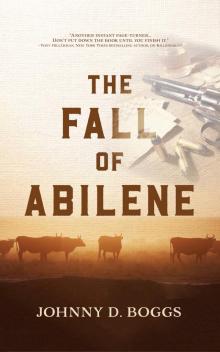 The Fall of Abilene
The Fall of Abilene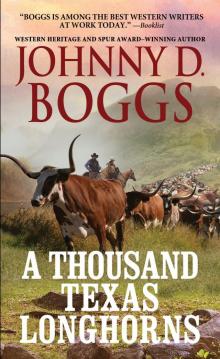 A Thousand Texas Longhorns
A Thousand Texas Longhorns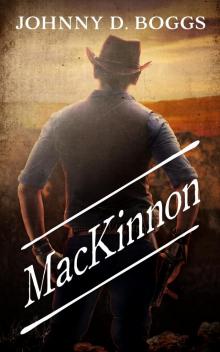 MacKinnon
MacKinnon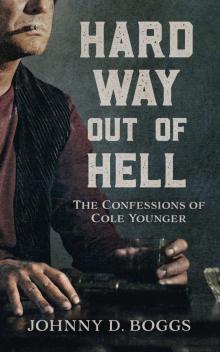 Hard Way Out of Hell
Hard Way Out of Hell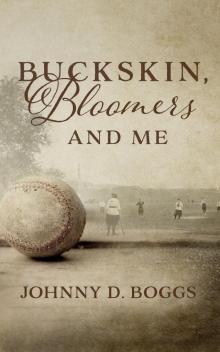 Buckskin, Bloomers, and Me
Buckskin, Bloomers, and Me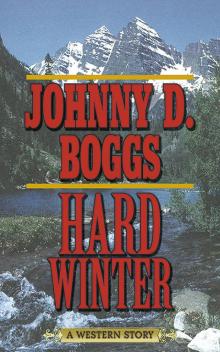 Hard Winter
Hard Winter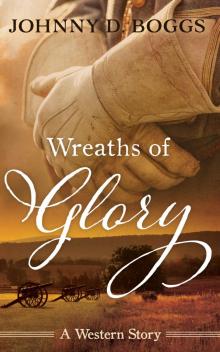 Wreaths of Glory
Wreaths of Glory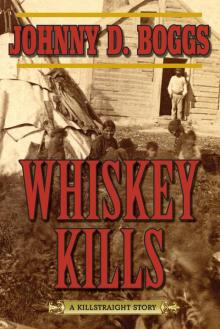 Whiskey Kills
Whiskey Kills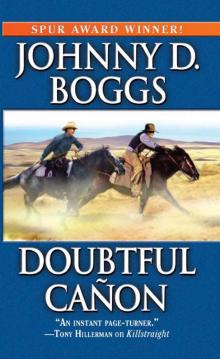 Doubtful Canon
Doubtful Canon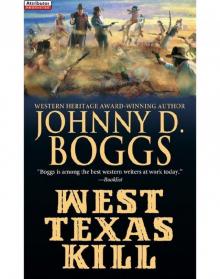 West Texas Kill
West Texas Kill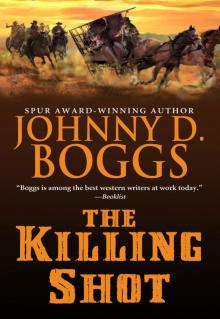 The Killing Shot
The Killing Shot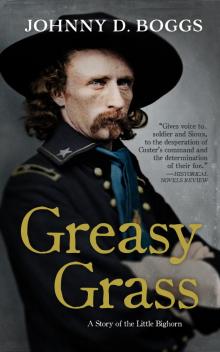 Greasy Grass
Greasy Grass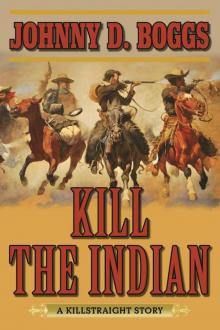 Kill the Indian
Kill the Indian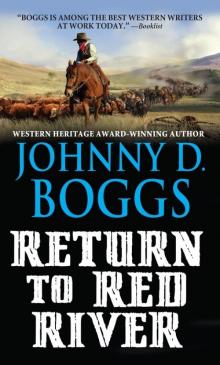 Return to Red River
Return to Red River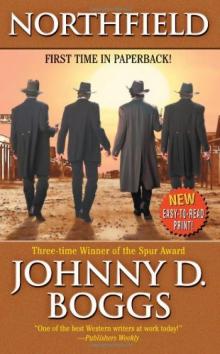 Northfield
Northfield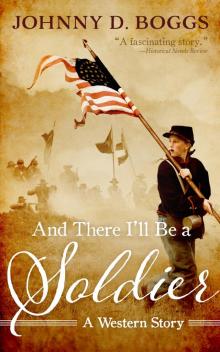 And There I’ll Be a Soldier
And There I’ll Be a Soldier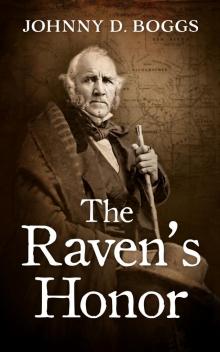 The Raven's Honor
The Raven's Honor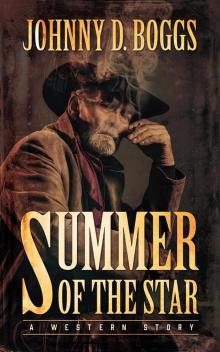 Summer of the Star
Summer of the Star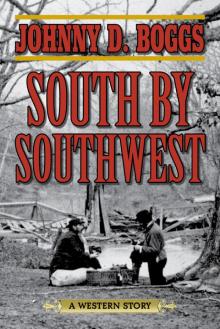 South by Southwest
South by Southwest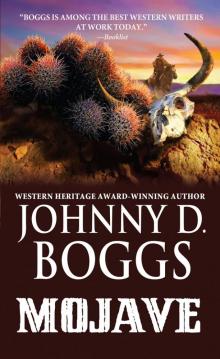 Mojave
Mojave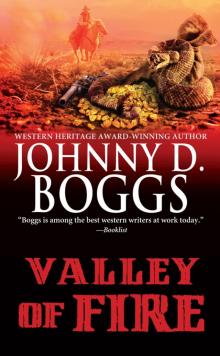 Valley of Fire
Valley of Fire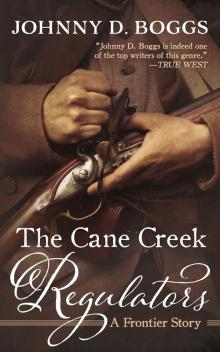 The Cane Creek Regulators
The Cane Creek Regulators